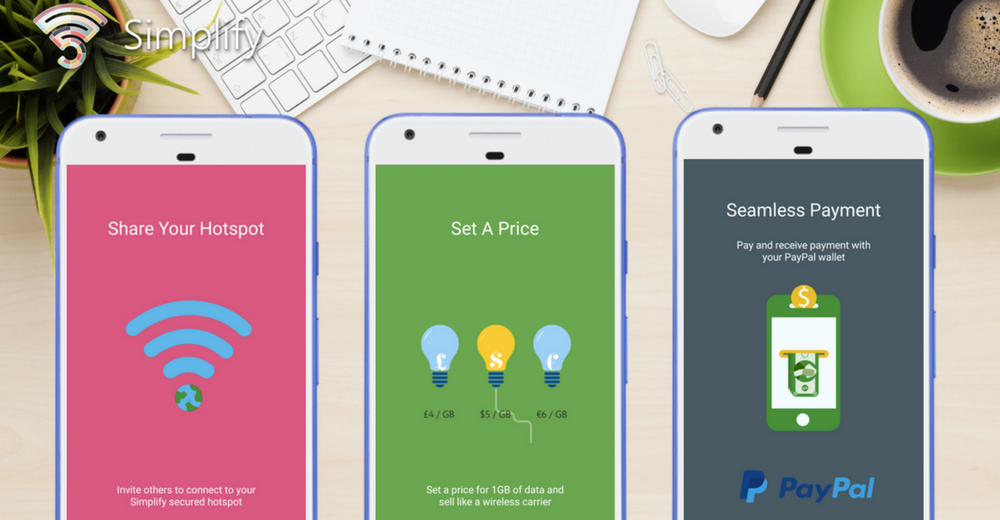It’s hard to imagine our lives without mobile data.
We rely heavily on it and local telecommunication companies have been feuding for the longest time to come up with packages that can best attract users.
As consumers, we’ll choose the packages that best suit our needs. Usually, it’s a fine balance between having enough data and spending the least.
Recently, my subscription plan saw an upgrade (yay!) but I was left with more data than I could use. What a waste, or so I thought.
Enter Simplify, an app that allows users to sell excess mobile data for money. They were recently named as one of the 50 Most Innovative Companies for 2017 by Fast Company. They’re the only Malaysian company listed and it’s clear that their idea and model is attention-grabbing.
Initially, Simplify took a B2B approach with the team selling directly to corporates. But the long wait for contracts got them thinking.
After getting feedback from the mentors and investors at the Global Entrepreneurship Bootcamp by Massachusetts Institute of Technology, founder Yen Pei Tay decided to reboot Simplify as a C2C business by helping people resell mobile internet.
So How Does It Work?
The app was launched for Android on August 16 of 2016 with plans on having an iOS version out some time in 2017.

Let’s say you have a lot of mobile you’re willing to sell off. As a seller, the process is simple:
- Sign up on the app.
- Decide on the rates.
- Decide which currency to charge with and how many GB you’re selling.

The buyer experience is as follow:
- Load up the app.
- View the listings nearby.
- Choose a plan.
- After confirmation, the app will automatically connect. No need for passwords.
Both buyers and sellers are able to access the usage tab and monitor how much data they are consuming.
The app only charges for how much you use. For example, if you purchase a plan of 1GB for US$5 but end up only using 10MB, the payment will only come out for five cents. The team takes a 25% commission fee.
“Simplify allows sellers to sell at any rate, thus, we do not control the rate. We are reselling Wi-Fi bandwidth and Wi-Fi is unlicensed mobile access,” said Yen Pei to Vulcan Post.
Security may be a concern, which Yen Pei understands. Strangers try to piggyback on mobile data all the time. To balance this, Simplify auto-creates a secure hotspot and encrypts both the password and channel.
But Here’s The Catch

1. The interface of the app needs work.
There is minimum introduction on how it works. I was left confused with the function of the QR code attached to a network connection and spent some time trying to figure it out. Later, I found out it was just an optional feature.
(Users can just connect with each other “over the air” without needing to scan any QR code.)
Even setting up the mobile hotspot to sell data took was an effort of trial and error. Mostly error.
Reviews on the Play Store have also commented on this and about their struggles with using the app.
2. There are limitations to its use.
There are companies and even countries with laws or policies that prohibit users from sharing or selling their excess mobile data. For example, those with unlimited data plans are often barred from hotspotting or have to pay extra. Simplify is unable to bypass these.
3. The coverage range might be a problem.
You would need to be in range of the hotspot in order to remain connected. If you’re planning on moving around a bit, you’ll find that this would prove to be tricky as you would need to constantly be on the hunt for another Simplify user.
There are plans to introduce a feature that allows sellers to discover potential buyers nearby through Bluetooth technology rather than just relying on hotspot. This will help with conserving battery life and make it easier for Simplify users to connect, but doesn’t solve the problems of needing to have the user within range.
4. You can only pay through PayPal.
PayPal might have taken off overseas but not many Malaysians actively use it at the moment. This might affect the rate of user adoption here.
Yen Pei told Vulcan Post that they’re working on making an in-app wallet for users in the future but for now, there’s only PayPal.
5. What do the telcos think?
In terms of the telecommunications companies themselves, Yen Pei believes there should be no issues with congestion. He compared it to ride-sharing services; tethering works by reducing network traffic congestion rather than overloading it.
So Can This Still Fly?

Yen Pei keenly believes in his vision of creating a community where internet can be bought.
Their pool of users is not only targeted to travellers or users low on data. Simplify is also looking at ride-hailing drivers. Especially in cases where airports are not in the middle of major cities, people arriving into the country may find that their internet connection choices are limited.
So to solve this, another way for drivers to earn some income would be to offer Wi-Fi services to their passengers through the Simplify app.
“We already have Uber and Grab drivers using Simplify. We have reviewed our terms of service with Platcom Ventures, a Malaysian government entity, and do not foresee any legal implication,” said Yen Pei.
Yen Pei’s future plans for Simplify includes helping governments through analytics. The data they collect through the app can help with understanding user behavior such as the peak times when they connect to the internet, what devices they use, and the quality of mobile networks in specific areas. The team then can break down the data to find patchy areas of coverage for better planning and infrastructure needs.
Feature Image Credit: Simplify









